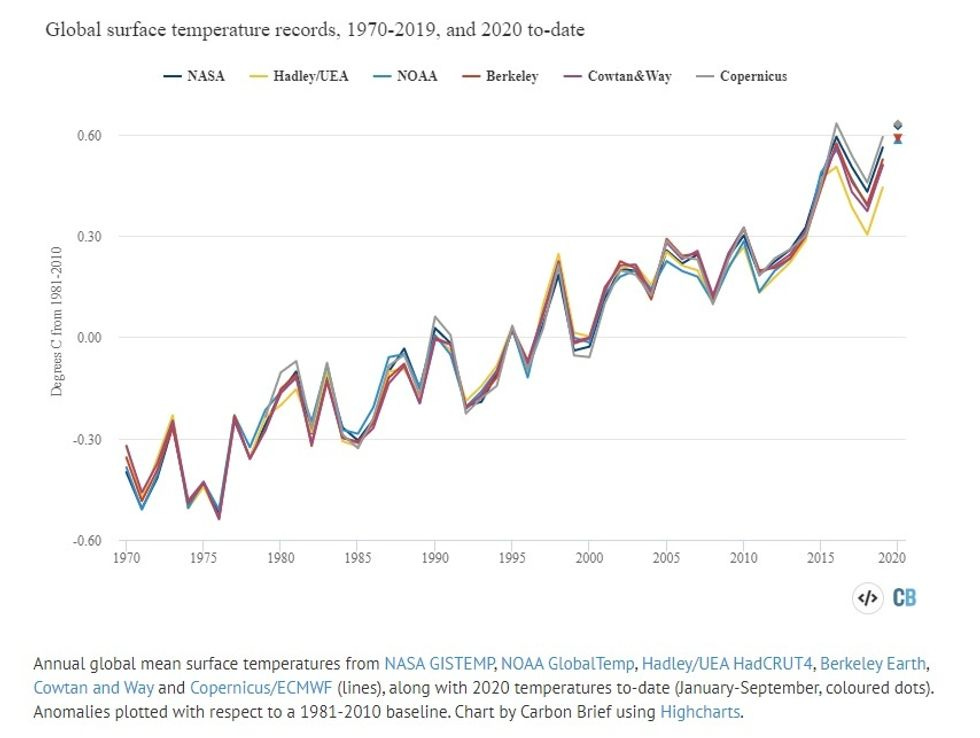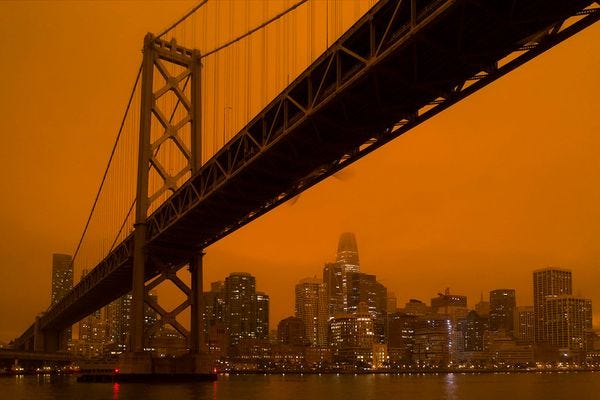2020: It's Hot! In The Hot Tub! And Everywhere Else On Earth!
Our Stupid Species still has a chance.
After starting out with devastating wildfires in Australia , seeing the collapse of Canada's last intact ice shelf, and moving into the fall with more horrific wildfires across the western USA, 2020 is on track to have the hottest surface temperatures in Earth's recorded history, at least since reliable temperature record-keeping began in the 1880s. That's according to an analysis by the UK climate website Climate Brief, which notes that in addition to the likely record for hottest year, the first three quarters of 2020 also saw record concentrations of the worst three greenhouse gases (carbon dioxide, methane, and nitrous oxide).
On top of that, we've had record low average levels of Arctic sea ice this year for most of the summer; although the "summer minimum" — the single lowest amount of sea ice in a year — was only the second lowest on record. Keep trying, humanity, and we can (hell, we will ) beat that 2012 record soon. The awful thing is that it takes no effort at all.
Even if the final three months of 2020 are cooler than predicted and we only land somewhere in the top three warmest years in history (as NOAA predicted earlier this month), what really matters isn't whether one year or another sets a record, it's the overall trend, which data from the past 50 years makes clear. Here's a screenshot of an interactive trend line from the six research groups Climate Brief analyzed, from 1970 through the end of September 2020, using the average 1981-2010 temperature as the center point:

What's really remarkable about 2020 is that while previous record-setting years have been helped along by El Niño events in the Pacific Ocean, which increase global temperatures, 2020 hasn't had any notable El Niño activity. We got here all on our own! Congratulations to all of us who've participated in industrialized society since the Age of Steam, but especially to all of us who have been driving, using electricity, and pouring cement since 1988: Half the world's industrial CO2 pollution has been emitted since then. 1988 is an especially fun year, since by then, the science on global warming was largely settled and the UN first established theIntergovernmental Panel on Climate Change.
I was surprised that the Carbon Brief report doesn't even mention the other human catastrophe of 2020, the coronavirus pandemic, and the world's brief pause for varying degrees of shutdowns earlier this year. We remember people on Twitter wondering whether the widespread pause of so much economic activity would result in a dip in greenhouse gases, but the report simply notes that "Greenhouse gas concentrations reached a new high in 2020, driven by human emissions from fossil fuels, land use and agriculture."
Now, there were temporary drops in emissions during the shutdowns, and noticeably clearer skies as particulates and other pollutants from vehicle exhaust were sharply reduced. But there's a real difference between air pollution near the surface of the Earth and the continued rise in greenhouse gas concentrations. A few weeks of not driving or flying couldn't do much to affect the overall levels of greenhouse gases in the world's atmosphere, because all the CO2 we've added to the atmosphere for over 150 years stays there, trapping heat and warming the planet.
That's why we need to move away from fossil fuels: The stuff that's already there won't go away, so the more we add, the worse the warming will get. Donald Trump may have thought he really scored points against Joe Biden in the final presidential debate when Biden "admitted" he wants to transition away from fossil fuels to cleaner energy sources. But that's pretty much the point . To keep this planet habitable for large mammals that make machinery and like the idea of self-governance, we have to limit the damage we continue to do. That's the whole deal, whether you call it green or new.
Also, as plenty of climate activists point out, the response to the pandemic is also cause for hope. Within days, billions of people around the world suddenly altered how they lived, for the sake of preventing the spread of the pandemic. It was a huge disruption and an economic shock, but it illustrates that we can make big changes to save lives.
Take a look, if you have the free views left, at this Washington Post story on Greensburg, Kansas, a small town that was flattened by a powerful tornado in 2007, and decided to build back carbon-neutral, with 100 percent green energy. If you're out of WaPo views, Scientific American wrote about Greensburg in 2009, and the Department of Energy wrote an entire 63-page profile (PDF format) of Greensburg, with recommendations for other communities, in 2013. And now, says the Post story,
Greensburg draws 100 percent of its electricity from a wind farm, making it one of a handful of cities in the United States to be powered solely by renewable energy. It now has an energy-efficient school, a medical center, city hall, library and commons, museum and other buildings that save more than $200,000 a year in fuel and electricity costs, according to one federal estimate. The city saves thousands of gallons of water with low-flow toilets and drought-resistance landscaping and, in the evening, its streets glow from LED lighting.
You want to see the future? It's green, and it's spectacular. And while it's the sort of thing Joe Biden is talking about, it's far from a socialist hellhole — in fact, as the Post notes, the surrounding county went heavily for Trump in 2016. Greensburg's former mayor, a Republican, actually used the slogan "Build Back Better" years before Joe Biden adopted it.
Over the next century, 2020's record-setting temperatures are certain to be eclipsed by hotter years. But we have control over how much worse it will get. For starters, we can start by making sure we choose leaders who know the difference between "clean air" and reductions in carbon emissions, and who understand that the shift to a clean economy can mean creating lots of well-paying jobs. Happily, Biden's plan is projected projected to do that , too.
[ Carbon Brief / NOAA / Nature / MarketWatch / Scientific American / Guardian / WaPo / Scientific American / Department of Energy / Photo by Christopher Michel, Creative Commons license 2.0 ]
Yr Wonkette is funded entirely by reader donations. Please help us keep the servers humming and the writers paid, won't you?
Do your Amazon shopping through this link, because reasons .




from the britcom Fawlty Towers:
Polly: "Which part is puffed up?"Basil (whispering) "Her eyes."Polly: "What?"Basil: "Eyesssss."Polly (to nurse) "Her thighs"Nurse "THIGHS?????!!!!!"
This is another matter to put before THE U.N.. The fossils need to face the music for demonizing any efforts to move off of their poisoned tits. They know exactly what they've done and why. It's a crime against humanity.